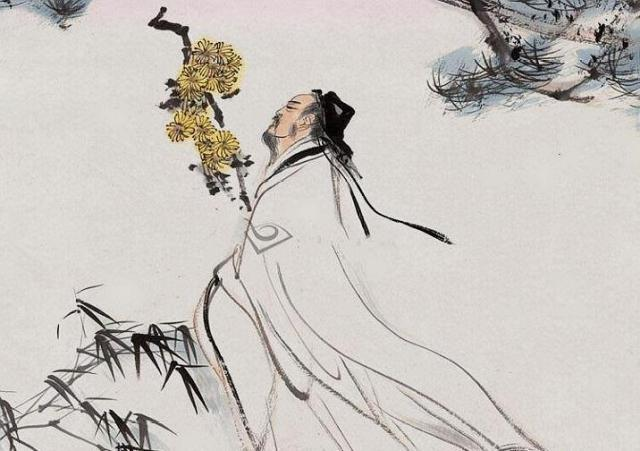
A brief introduction
The career of Tao Yuanming or Tao Qian was divided between the Jin and Song dynasties. He was born at Chaisang in Xunyang, now Jiujiang in Jiangxi, became a minor official at 29 and then resigned to till the land. Unable to support his family, he was persuaded to accept the magistracy of Pengze. When 80 days later it was suggested he spruce himself up for a visit from his superior he retorted, “ I will not bow down to a country boy for five pecks of rice,” and immediately left for home, abandoning his post. Even in seclusion he was hounded by misfortune. His house burned down when he was 44, and his last two decades were passed in destitution, though he refused official aid with contempt.
Among Tao Yuanming’s prose pieces, “The Record of Peach Blossom Spring” (Taohuayuan ji) is one of the most beloved texts in classical Chinese literature. It describes a utopian community where there are no usual social constraints such as taxation and hierarchy, and every one lives in contentment. Hidden away in the mountains, the community is accidentally discovered by a fisherman. Later, the fisherman tries to retrace his steps, but he can never find the community again. The story of the Peach Blossom Spring has inspired numerous writings in later times and become a minor literary tradition in itself.
《桃花源记》
晋太元中,武陵人捕鱼为业。缘溪行,忘路之远近。忽逢桃花林,夹岸数百步,中无杂树,芳草鲜美,落英缤纷,渔人甚异之。复前行,欲穷其林。
林尽水源,便得一山,山有小口,仿佛若有光。便舍船,从口入。初极狭,才通人。复行数十步,豁然开朗。土地平旷,屋舍俨然,有良田美池桑竹之属。阡陌交通,鸡犬相闻。其中往来种作,男女衣着,悉如外人。黄发垂髫,并怡然自乐。
见渔人,乃大惊,问所从来。具答之。便要还家,设酒杀鸡作食。村中闻有此人,咸来问讯。自云先世避秦时乱,率妻子邑人来此绝境,不复出焉,遂与外人间隔。问今是何世,乃不知有汉,无论魏晋。此人一一为具言所闻,皆叹惋。余人各复延至其家,皆出酒食。停数日,辞去。此中人语云:“不足为外人道也。”
既出,得其船,便扶向路,处处志之。及郡下,诣太守,说如此。太守即遣人随其往,寻向所志,遂迷,不复得路。
南阳刘子骥,高尚士也,闻之,欣然规往。未果,寻病终,后遂无问津者。
In the year of Taiyuan of the Jin Dynasty, there lived a man in Wuling jun who earned his living by fishing. One day, he rowed his boat along a stream, unaware of how far he had gone when all of a sudden, he found himself in the midst of a wood full of peach blossoms. The wood extended several hundred footsteps along both banks of the stream. There were no trees of other kinds. The lush grass was fresh and beautiful and peach petals fell in riotous profusion. The fisherman was so curious that he rowed on, in hopes of discovering where the trees ended.
At the end of the wood was the fountainhead of the stream. The fisherman beheld a hill, with a small opening from which issued a glimmer of light. He stepped ashore to explore the crevice. His first steps took him into a passage that accommodated only the width of one person. After he progressed about scores of paces, it suddenly widened into an open field. The land was flat and spacious. There were houses arranged in good order with fertile fields, beautiful ponds, bamboo groves, mulberry trees and paths crisscrossing the fields in all directions. The crowing of cocks and the barking of dogs were within everyone's earshot. In the fields the villagers were busy with farm work. Men and women were dressed like people outside. They all, old and young, appeared happy.
They were surprised at seeing the fisherman, who, being asked where he came from, answered their every question. Then they invited him to visit their homes, killed chickens, and served wine to entertain him. As the words of his arrival spread, the entire village turned out to greet him. They told him that their ancestors had come to this isolated haven, bringing their families and the village people, to escape from the turmoil during the Qin Dynasty and that from then onwards, they had been cut off from the outside world. They were curious to know what dynasty it was now. They did not know the Han Dynasty, not to mention the Wei and the Jin dynasties. The fisherman told them all the things they wanted to know. They sighed. The villagers offered him one feast after another. They entertained him with wine and delicious food. After several days, the fisherman took his leave. The village people entreated him not to let others know of their existence.
Once out, the fisherman found his boat and rowed homeward, leaving marks all the way. When he came back to the jun, he reported his adventure to the prefect, who immediately sent people to look for the place, with the fisherman as a guide. However, the marks he had left could no longer be found. They got lost and could not find the way.
Liu Ziji of Nanyang jun, a learned scholar of high repute, was excited when he heard the fisherman's story. He devised a plan to find the village, but it was not carried out. Liu died soon afterwards, and after his death, no one else made any attempt to find it.
Significance of Tao Yuanming
The personalized voice of a poet
Tao Yuanming is certainly not the first Chinese poet to write poems on reclusion, but his uniqueness lies in the fact that he transforms the conventional vocabulary and stock images of poetry on reclusion into a highly personalized poetry, and combines traditional themes and forms with a complex individual voice. More than anyone before him, his poetry alludes to the particular circumstances of the poet in the historical here and now rather than to a generic gentleman-recluse. Such gestures of individuation can be seen as part of a larger discursive tendency from the third century on. Tao Yuanming, however, integrates the narrative element into his poetry itself, making it effectively a poetry of autobiography, even if this autobiography is a highly constructed self-image rather than an “objective” documentary.